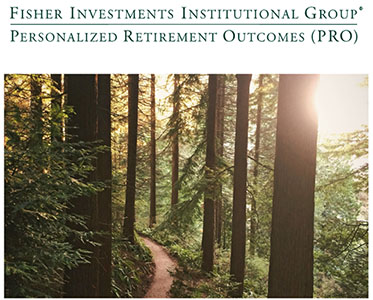
The PRO Difference
PRO participants receive the benefit of actively managed investment funds advised or managed by Fisher Investments’ Investment Policy Committee (IPC).
This helps allow for cohesive and effectively communicated management. Our actively managed funds can also help provide risk controls if we forecast a change in market conditions.
The Essentials of PRO
- PRO is a managed account service that delivers a personalized investment portfolio for each enrolled participant.
- As a participant’s circumstances evolve, PRO automatically adjusts the portfolio to stay aligned with their needs and goals.
- PRO provides participants with an opportunity to share additional personal information, enabling more tailored asset allocation based on their unique circumstances.
- Additionally, PRO offers personalized savings and financial recommendations to help participants get and stay on track toward their retirement income goals.
How Advisers Use PRO
Fisher PRO is a managed account service designed to enhance your clients’ retirement plans. Our relationship managers can provide performance comparisons of the PRO service against the target date funds of your choice. We can also develop a tailored plan sponsor presentation to support your recommendation of adding PRO to a plan.
PRO serves as your DCIO partner, giving you access to a dedicated client service team that helps save time, reduce administrative burden, and support the fulfillment of fiduciary responsibilities. We deliver on-demand benchmarking, adoption, and participant engagement reports that document success and help reduce liability. Our concierge-level support - customized to your preferences - includes a full range of educational and service materials for both plan sponsors and participants.
PRO Benefits Participants and Plan Sponsors
Accessible as a Full Default, Dual/Hybrid Default, or Opt-In Solution:
Available to a retirement plan as an affordable qualified default investment alternative (QDIA) or as an additional election option for participants.
Personalized Participant Allocations:
PRO provides personalized asset allocations for each individual participant, using information provided by the recordkeeper. PRO implements and monitors personalized asset allocations without requiring participant engagement.
Streamlined Benchmarking:
PRO’s consistent and streamlined portfolio-construction approach gives participants diversification without complexity. Our approach allows easy benchmarking capabilities for plan sponsors and their retirement advisers.
Easy Engagement:
PRO offers an easy-to-use online portal for participants who would like a better understanding of their retirement outlook. Participants can easily provide additional information (such as spousal age and outside income) that could further help refine their personal asset allocations.
How You Can Implement PRO
QDIA

Dynamic/Dual QDIA

Opt-In
PRO Can Assist Retirement Plans at the Following Recordkeepers*
- Empower
- Schwab Retirement Plan Services
- Transamerica
- T. Rowe Price
- Voya
*Additional eligibility rules may apply. Personalized Retirement Outcomes is a service offered by Fisher Investments wholly or in coordination with other service providers. Please discuss with your client's recordkeeper.







